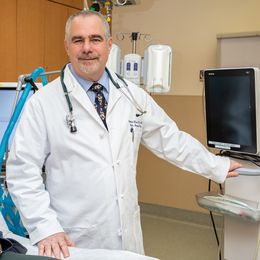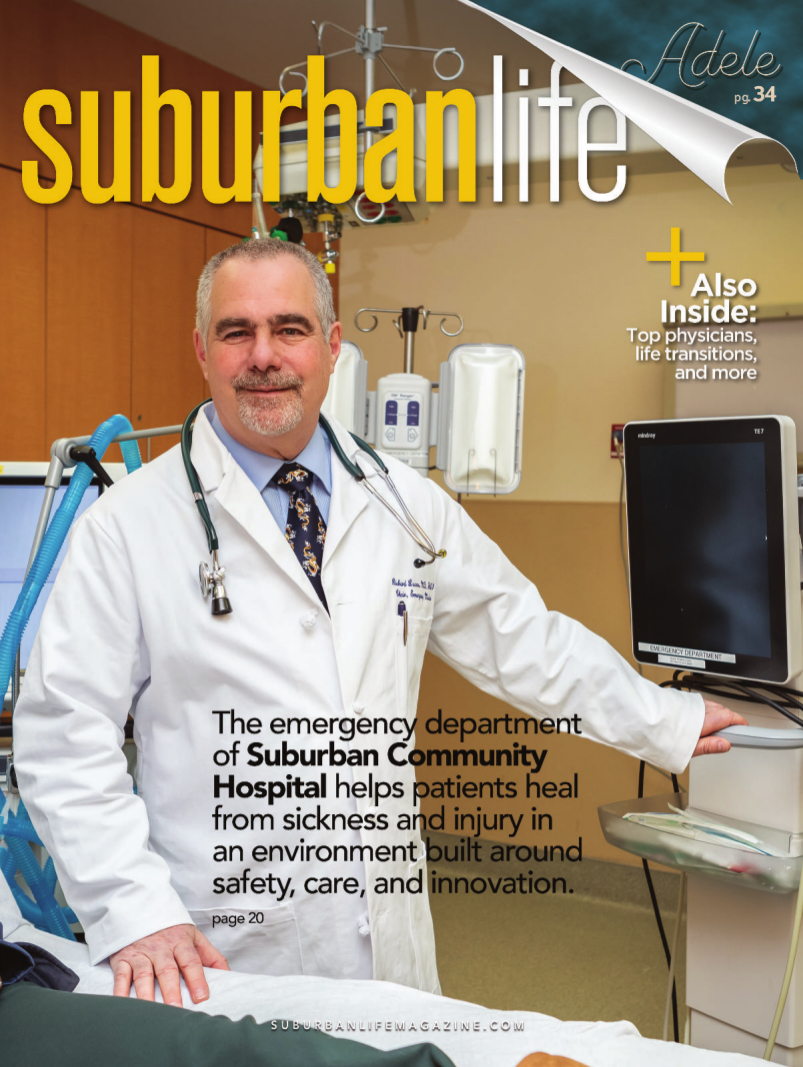
Suburban ‘Safety Net’
The emergency department of Suburban Community Hospital helps patients heal from sickness and injury in an environment built around safety, care, and innovation.
Richard M. Lucas, M.D., FACEP, remembers most of the clinical rotations during his education at Albert Einstein College of Medicine in the Bronx, New York, as “routine and predictable.” When he did his rotation in Jacobi Medical Center’s emergency department, however, he realized he had found his calling.
“In some ways, it was like the Wild, Wild West,” says Dr. Lucas, who grew up in the Philadelphia area. “You had someone with a broken arm in one room, someone in need of a medication refill in the next, and someone with a heart attack in another. It was an exciting environment, because you had so many people who needed care and you had a real opportunity to help people.”
Today, Dr. Lucas is the chair of the department of emergency medicine and chief of staff at Suburban Community Hospital, which is part of Prime Healthcare’s award-winning health system. Since joining the East Norriton-based hospital approximately 12 years ago, he has been heartened by the family-like atmosphere and the ever-deepening commitment to delivering exceptional care.
Dr. Lucas leads a team of seven board-certified physicians who manage “the entire realm of problems,” as he says. Some of his colleagues have been working in Suburban Community Hospital’s emergency department for as long as he has; one of them, James G. McHugh, M.D., has been part of the team for nearly 20 years.
“Suburban is a hidden gem,” Dr. Lucas says. “I came here because I had heard good things about the hospital, and I stay here because I get to work with a seasoned, well-trained group of emergency physicians. There’s a real camaraderie here that leads to a caring environment. Our providers live in the community, and I think it shows in the level of care we deliver day in and day out. We also get to be on the cutting edge of medicine, with everyone devoted to helping the people who most need it most.”
Since March 2020, the patients who have needed the most help have been those contending with the debilitating symptoms of COVID-19.
“Pre-COVID, we saw all the different things that presented to the emergency department,” Dr. Lucas recalls. “Once COVID hit, it became COVID and COVID only. We operated in a kind of COVID cloud for a long time, seeing the sickest of the sick. At the same time, everyone was taxed for resources, so we had daily calls and twice-a-day huddles about manpower, PPE, and drug therapy. We were the first in the community to offer monoclonal antibodies, and we continue to administer them to this day.”
As the crisis stage of the pandemic continues to wind down, Dr. Lucas looks back on the past two years with immense pride for the many ways in which he and his colleagues served the community during a particularly challenging time. He also suggests the emergency department has more or less reverted to pre-pandemic life. For example, the department has reinstituted visitor policies, and patients have returned to the ER for “the usual array of injuries and illnesses,” as Dr. Lucas puts it.
First-class Care
Suburban Community Hospital has provided high-quality health care to Montgomery County residents for more than 75 years. Despite its longevity, many area residents are surprised to learn of the advancements the hospital has embraced in recent years. Dr. Lucas points to two recent examples adopted by the hospital’s emergency department:
Suburban Community Hospital has provided high-quality health care to Montgomery County residents for more than 75 years. Despite its longevity, many area residents are surprised to learn of the advancements the hospital has embraced in recent years. Dr. Lucas points to two recent examples adopted by the hospital’s emergency department:
* ACE Program. Short for Advanced Care for the Elderly, the ACE Program benefits older patients who visit Suburban Community Hospital’s emergency department. Elements of the program include specially trained physicians and nurses; special rooms designed to create a relaxing atmosphere specifically for patients ages 65 and older; parking spaces near the front entrance to the emergency department; and additional resources upon discharge, including physical therapy, nutrition, social work, and pharmacy services. Suburban Community Hospital has been accredited through GEDA, the Geriatric Emergency Department Accreditation Program, a distinction few other area hospitals can claim, according to Dr. Lucas.
* Ceribell Rapid Response EEG. Ceribell Rapid Response EEG allows Suburban Community Hospital’s staff to detect nonconvulsive seizures. Dr. Lucas describes the technology as “a game changer” because it makes EEG more accessible and reduces the likelihood of secondary brain injury. “This used to be a capability you would find only in big academic centers, but now we can do it in a community setting 24 hours a day,” he adds. “As a result, we can prevent unnecessary transfers downtown and identify conditions in need of treatment in order to save brain tissue.”
Similarly, Suburban Community Hospital has strengthened its ability deliver life-saving interventional care to stroke patients. The combination of teamwork, technology, and treatment guidelines, as well as partnerships with organizations such as the Global Neurosciences Institute, helped the hospital earn accreditation as a primary stroke center from The Joint Commission. The department also received a “Get With the Guidelines” Stroke Gold Plus with Honor Roll Elite Plus Award from the American Heart Association/American Stroke Association.
“Time is everything when it comes to stroke,” Dr. Lucas says. “Two million neurons die a minute without treatment, so getting the clot-busting drugs in as quickly as possible can keep disability from stroke to a minimum. For large-vessel occlusions, we can go in and do interventional work to remove the clot itself. A cerebral angiogram can identify people who are candidates for clot removal so we can get them to a comprehensive stroke center as soon as possible.”
No matter why someone comes to Suburban Community Hospital for emergency care, Dr. Lucas says they will find a safe, clean, and secure environment in which to receive treatment. He cites the hospital’s recent Leapfrog Hospital Safety Grade—another “A” rating—based on 22 evidence-based measures of patient safety.
“When people come to Suburban Community Hospital, they can expect see the same providers they’ve always seen, and the same great care we have always provided,” he adds. “We’re here 24 hours a day, and we turn no one away. Emergency medicine is the safety net for the community. We’re here to identify and address problems before they become serious, or address the serious ones as quickly as possible.”
Suburban Community Hospital
2701 Dekalb Pike
East Norriton, PA 19401
(610) 278-2000
www.suburbanhosp.org
2701 Dekalb Pike
East Norriton, PA 19401
(610) 278-2000
www.suburbanhosp.org
Photograph by Nina Lea Photography
Published (and copyrighted) in Suburban Life magazine, February 2022.



